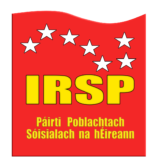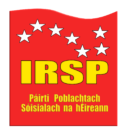The Arrest of One of Our Own
The following statement was forwarded to IRSP party comrades through contact with the CCFR (Collective of French-speaking combatants of Rojava). It is being released today in French speaking media through the journal ‘Lundi Matin’ – and the IRSP has been asked to spread it through its own media outlets in Ireland. Statement is as follows:
Last December, seven people were arrested by the DGSI (French General Directorate for Internal Security) and indicted for what the French state proclaims as “terrorist criminal association”. A former YPG volunteer, a member of the Armed Forces of Syrian Kurdistan, was named as the group’s leader and jailed. Of this affair so far, we only know what has been leaked in the press. A few hunting weapons, commercially available products that according to state sources “can be used in the manufacture of explosives”, meetings in forests, and the alleged confessions of the “least involved” members of the group. Other than that, nothing: no list of targets, nor definite plans to take action. As trials of counter-terrorism justice rests on intent, these few elements have been interpreted by the State as evidence of preparations for an attack on law enforcement agencies. To compensate for the thinness and outright weakness of the file and evidence, attention has instead been focused on the personalities of the accused: a “firework controller at Disneyland”, a person who ‘could’ have had contact with a Colombian guerrilla, and above all an activist “who went to Syria to fight in a group affiliated with the YPG”. These “disturbing profiles” have found their way into the press through means of a crude staging by the French State intended to arouse fear, and silence any thinking that does not support police theories. The DGSI orchestrated these leaks by delivering to the media the identities and photos (barely blurred) of the accused. For days, the details of the case were transmitted to the press despite the supposed secrecy of the investigation. Throughout the process up to now, the defendants have been displayed publicly as hunting trophies by the DGSI.
The right-wing and far-right press have given their all in milking the drip deed of state propaganda emerging around the case with their biased profile and blatantly unfair spotlight that was placed on our comrade – a black and white photo with a thin black rectangle over his eyes, a caption describing him as “homeless”, “not working” and “having fought in Syria”. This misleading portrayal of the new ‘public enemy number one’ is based on a mixture of false value judgments about his way of life and fragmented information about his political involvement.
It is true that our comrade was in Syria to fight against ISIS (Daesh). In 2017 he took part in the liberation of Raqqa, the capital of the jihadist group. Raqqa is also the city where the Paris attacks were planned and where most of its perpetrators were trained. That France has not experienced large-scale attacks in a number of years, is thanks to the liberation of Raqqa in which our comrade participated at the risk of his own life. By fighting in Syria, the latter therefore directly contributed to the security of France and the French people – something which the media tribunal was careful not to mention! How indeed can they fit into their narrative that the accused hasn’t given much more to the fight against terrorism than the police, prosecutors and journalists who accuse him today of being an “ultra-left terrorist”?
To understand this matter, one has to go back to the beginning of the engagement of international volunteers in Syria. Between 2015 and 2019, around thirty French people responded to the call of the populations of Rojava – to come and protect the people of Rojava by participating in the war of self-defence against ISIS (Daesh) and the Turkish army. The DGSI immediately established a ranking between the “bad” volunteers, claiming to be of a revolutionary ideology, and the “good” volunteers, which included former soldiers or ‘apoliticals’, who for some reason were not even detained and questioned on their return to France. Those who were identified as potential members of a mythical “ultra-left” systematically found themselves “S-files” and subject to active surveillance, while being guilty of nothing other than a crime of opinion in comparison to other volunteers who joined the fight against ISIS (Daesh) – but yet whom the State deemed undesirable. Arrests at the airport, threats in the form of faux-paternalistic advice, pressure on families, and many of us being the subject of more or less veiled intimidation attempts by the security services. One example being that at the end of 2016, the DGSI broke into the home of one of us to withdraw his passport and identity card, in order to prevent him from returning to Syrian Kurdistan. The Interior Ministry then falsely claimed that this YPG fighter could be the origin of “serious disturbances to public order” and was likely to use his military experience “in attacks against French interests, in connection with the revolutionary ultra-left”.
These completely fanciful accusations were swept aside by the Paris administrative tribunal a few months later. The Ministry of the Interior was then forced to return identity documents to our comrade and pay him damages. Despite this legal victory, we knew that the DGSI would keep us in it’s sights and was ready to do anything, including the spreading of unproven accusations, to make us fit the mold that it itself had created: that of presenting us as dangerous veterans of the ultra-left seeking to import the violence of the Syrian conflict back home. This cartoon creation was built from the start, out of nothing, even before any of us set foot again on French territory. Even though, back in France, no volunteer was ever involved in violent actions, the DGSI patiently waited for the opportunity to trap one of us, in order to finally give credibility to their fantasies. Last year, they spread lies about us through Mediapart reporters. Mediapart, a new site of faux-left appearance but of undoubtable ill-repute was eager to return the favour to the State sources which inform them on other matters. They in turn rolled out the red carpet to the delirious arguments of the Ministry of the Interior. Examples include accusations against a comrade who went on vacation to South America and found himself accused of having tried to make contact with Colombian guerrillas, and another attending a ZAD (defence zone opposing airport expansion in Brittany) of allegedly firing a flare at a gendarmerie helicopter. Damage to telephone antennas, Vélib terminals and police vans were also associated with us. These anxiety-provoking fables, perfectly disconnected from any reality, came to confirm what we already knew: until it had found the ideal culprit, the Ministry of the Interior would not give up the enterprise of demonization and that we were the object of such.
In addition to seeking revenge for the State embarrassment after The Tarnac Affair, the security services have for years pursued a dual objective: to criminalize internationalism and to use us as scarecrows to stigmatize the entire French revolutionary left. In the midst of the new law in France relating to ‘global security’, we see the DGSI manufacturing ‘terrorists’ at the opportune moment, in the service of a government which leads us every day a little more towards a police state. Laurent Nuñez (former director-general of the DGSI), showing incredible intellectual dishonesty, recently revealed his intentions in an interview given to Le Figaro in saying that “a dozen ultra-left activists went out to die in Rojava”. As we find ourselves collectively challenged by President Macron’s anti-terrorism adviser, clarification is needed. We went to Rojava with the will to defend a revolution based on direct democracy, peaceful coexistence between communities, equality between women and men and the fair sharing of wealth – many values that the French State falsely claims to maintain without ever having to apply. In order to do this, we did not try first to “harden ourselves”, we simply fought the jihadists of ISIS (Daesh) at the time when, in Paris and Nice, the same jihadists were massacring hundreds of people by taking advantage of the incompetence of France’s security services and their inability to protect.
The use of phrases such as “fight back”, are used against us to suggest that Rojava was just a pretext, a means of gaining military experience that we actually wanted to use in our home country. We were responding precisely to the reverse logic. We needed these military skills to fight ISIS (Daesh) and defend the existence of Rojava. However, having acquired such know-how does not mean that we wanted to use it back in France, or that armed struggle would suddenly have become the only means of action from our activist repertoire. We are not friends of this government, its watchdogs and the system they serve, that is a fact, but we fight them with democratic means and not with violence as our accusers imply.
The real extension of our struggle is our testimony. We pass on what we have seen and learned in Kurdistan through a book which we recommend as essential reading to those who would like to try to understand us. A testimony that is far from the clichés conveyed by the Ministry of the Interior and by the media at its orders. While the DGSI portrays us as plotters or vandals, we have actually spent the last few years picking up the thread of our (peaceful) lives. We continue to campaign to defend Rojava, the memory of our fallen comrades, and the values that prompted us to go there. On returning home we did not expect to receive the Legion of Honour, nor even to be thanked by anyone – but we could not have imagined that we would be targeted as enemies from within and treated in the same way as the jihadists we fought against. As we have recalled here, we have shown sufficiently that we are the subject of slander on the part of the DGSI and the French state. We don’t grant the slightest credibility to the accusations made against our comrade, to whom we reaffirm our absolute confidence and our unfailing support.
The CCFR (Collective of French-speaking combatants of Rojava).
https://www.librairielibertalia.com/web/hommage-au-rojava.html

